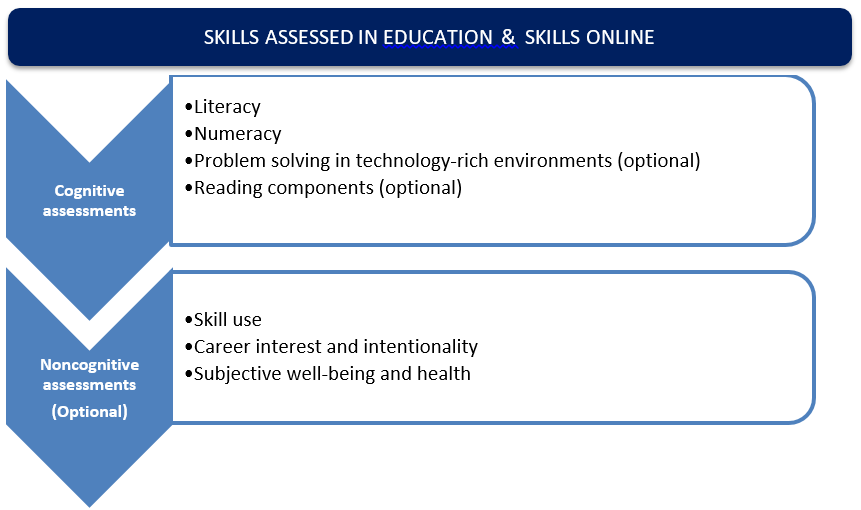Education & Skills Online assesses a set of cognitive and non-cognitive skills that individuals need for full participation in modern societies.
Cognitive Assessments
The Education & Skills Online cognitive measures of literacy, numeracy, reading components, and problem solving in technology-rich environments are based on the frameworks used for the OECD Survey of Adult Skills (PIAAC). The Literacy and Numeracy assessments contain a combination of items from the PIAAC survey and new items developed for Education & Skills Online. The Reading Components and Problem Solving in Technology-Rich Environments assessments contain only items from the PIAAC survey. The different components of the test are define as follows:
-
Literacy
Literacy is defined as understanding, evaluating, using and engaging with written texts to participate in society, to achieve one’s goals, and to develop one’s knowledge and potential.
-
Numeracy
Numeracy is defined as the ability to access, use, interpret and communicate mathematical information and ideas, in order to engage in and manage the mathematical demands of a range of situations in adult life.
-
Reading Components
To provide more detailed information about adults with poor literacy, the assessment of literacy administers an additional test of “reading component” skills to those adults with low skills. Reading components are the building blocks of literacy and the basic reading component skills that are needed for effective reading such as word recognition, decoding skills, vocabulary knowledge and fluency. This module helps distinguish between those who lack basic reading component skills from those who have mastered the mechanics of reading but are not skilled at comprehension.
-
Problem Solving in Technology-Rich Environments
Problem solving in technology-rich environments refers to the ability to use technology to solve problems and accomplish complex tasks. It is not a measure of “computer literacy”, but rather of the capacity to operate within a digital environment to solve the types of problem that adults face in their everyday life as users of digital technologies.
Non-Cognitive Assessments
Education & Skills Online includes non-cognitive skills Assessments that provide information on the use of skills at work and at home, the career interests of respondents, and respondents’ health and well-being. These categories of questions assess various factors that can have a direct impact on training and success in the workplace. They are:
- Skill Use
The skill use assessment utilises items from PIAAC to assess the specific skills that respondents use in both their work and daily lives as important drivers of skill acquisition as well as critical outcomes affecting their lives. The questions in this module focus on skills associated with reading, writing, use of mathematical information and ideas, and information and communications technology (ICT). The results for this assessment are linked to the PIAAC Skill Use domain scales.
- Career Interest and Intentionality
This assessment measures an individual’s preferences for different types of work activities and environments and the level of an individual’s intention to seek out new job opportunities and career- and job-related training.
- Subjective Well-Being and Health
This assessment examines the main components of subjective well-being: life evaluation and positive and negative affect, in addition to subjective health and well-being indicators.
- Behavioral Competencies (only available from March 2018 to June 2020)
This assessment measures selected personality facets based on their high relevance and utility for academic and workforce readiness and success.
Background Questionnaire
Education & Skills Online includes also a short background questionnaire with nine questions covering demographic characteristics, social and linguistic background, education, and employment status.


